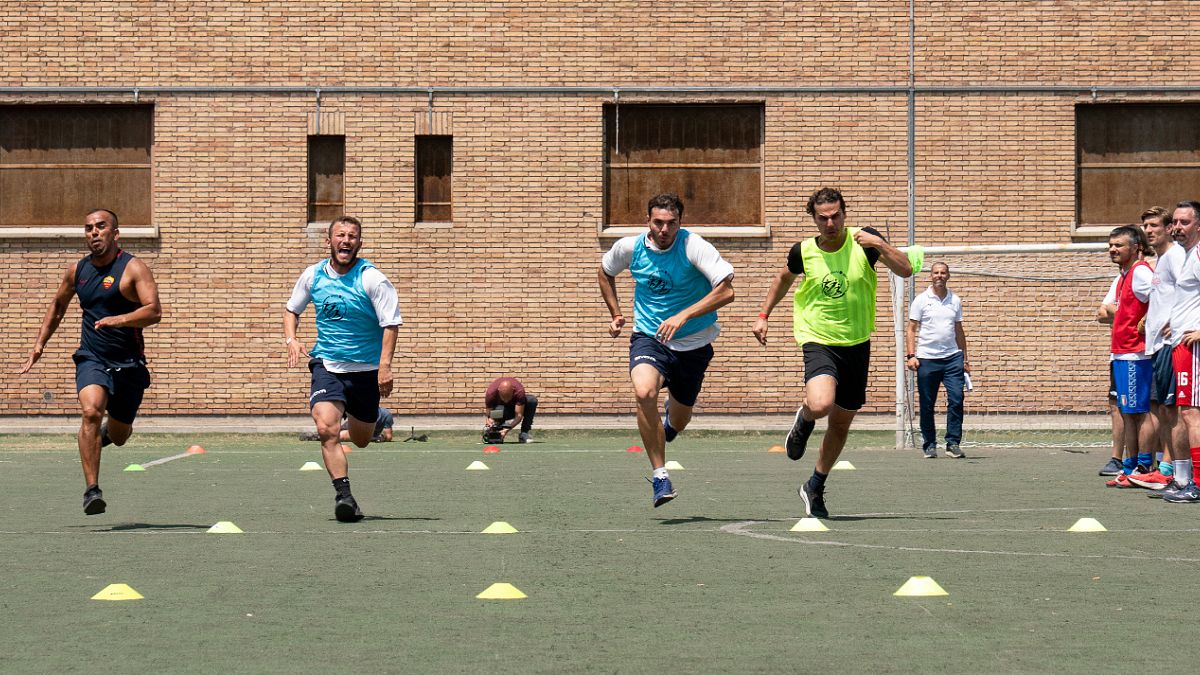A football pass between a prisoner and a magistrate. A volleyball match between penitentiary wardens and regular citizens.
It may sound like an unlikely sporting event but this unprecedented initiative at Rome’s Rebibbia prison saw inmates break the monotony of the daily routine and take part in a mini-Olympiad known as the “Games of Hope”
Within the walls of one of Italy’s most crowded prisons – Rebibbia is home to 1,550 inmates, an unexpected space opened up. Not an escape or a celebration, but a gesture of trust.
Four teams, made up of inmates, agents, magistrates and regular citizens, shared the field, crossing the lines that separate them every day.
It may have been a small event, only 28 of the prison’s inmates took part, but it was full of meaning.
The games were a collaboration between the John Paul II Foundation for Sport, the Department of Prison Administration (DAP) and the magistrates’ network, Sport and Legality.
And even after its debut instalment, the games are being hailed as one of the most significant initiatives to take place in Italy’s prison system in years.
And it is no coincidence that the event debuted in Rebibbia, where on 26 December Pope Francis opened a Holy Door at the prison, part of the 2025 Jubilee Year of Hope and a sign of hope and inclusion for all, including those who are incarcerated.
The Games of Hope featured four sports teams competing in various events, including football, volleyball, athletics, table tennis, table football and chess.
“Like all crazy ideas, that of the Games of Hope was born during the Paris Olympics, where we presented the book Father Henri Didon – A Dominican at the Origins of Olympism. It is to him that we owe the Olympic motto, ‘Citius Altius Fortius.’ We thought of bringing Olympic values to where it is hardest to enter, to prison,” said Daniele Pasquini, the president of the John Paul II Foundation for Sport.
A citadel for social reintegration
In the north-eastern quadrant of Rome, between the suburbs of Pietralata and Casal de’ Pazzi, Rebibbia stands as an island in itself.
It is not just a prison, but an entire citadel of detention. Its modern form was created in 1971 as a response to the overcrowding of the Regina Coeli prison. Today, it houses around 2,700 people, making it one of the largest and most complex detention centres in Italy.
The facility is divided into four main sections: the New Complex Raffaele Cinotti, the Third House, the Reclusion House and the Women’s Institute.
In total, about 1,927 men and 352 women are housed there, with the percentage of foreign inmates close to 13% among men and over 40% among women.
Those numbers speak of a fragmented prison population, often marked by people from the margins of society and feeling a sense of personal fragility.
Crimes, addictions, exclusion
More than half of the inmates are in the prison for crimes such as theft, robbery and fraud. Around 40% are in prison for more serious crimes, like assault and murders.
But one of the most significant data concerns drug addiction: 30-35% are imprisoned for drug-related crimes or have a history of addiction that has influenced their life choices.
Behind every statistic lies a story. Small-time drug dealers convicted as big-time traffickers, women entering a guilty plea to protect a violent or guilty partner, and young people with no real alternative other than the street.
For many, prison is not an exception, but a passage already foreseen in the script of their lives.
Rebibbia too suffers from the overcrowding that afflicts the entire Italian prison system. On a national level, with a regulatory capacity of approximately 51,000 places, the prison population exceeds 62,000.
In mixed cells, there is a lack of living space, activities are reduced and access to care is often minimal.
Sport as an antidote and hope
In this context, the Games of Hope were much more than a sporting event.
The president of the Italian National Olympic Committee (CONI), Giovanni Malagò, who took part in a game of table tennis, said: “It was an amazing initiative and it was important to be there, to touch, to see with one’s own eyes, beyond all expectations. I really liked the idea of this multidisciplinary tournament.”
Today in Italy, more than 60% of people who leave prison end up back behind bars. However, for those who manage to secure a stable job, recidivism rates drop to 1%.
That is why moments like the Games of Hope have a value that extends far beyond the day itself: they offer genuine opportunities for responsibility, meaningful relationships and dignity.
“The Games of Hope represent a moment of encounter between institutions, the prison world and civil society, and the beginning of a path to be taken together,” said the judge for preliminary investigations at the Court of Velletri, Fabrizio Basei, founder of the magistrates’ network Sport and Legality.
Rebibbia is a place that concentrates the contrasts of our time: justice and revenge, punishment and possibility, despair and humanity.
It was the prison of Cosa Nostra boss Totò Riina, but also the prison-workshop of writer Goliarda Sapienza. Inside, the shadows are many, but there is no lack of light.
And sometimes that light starts with a half-day of sport.
Read the full article here















